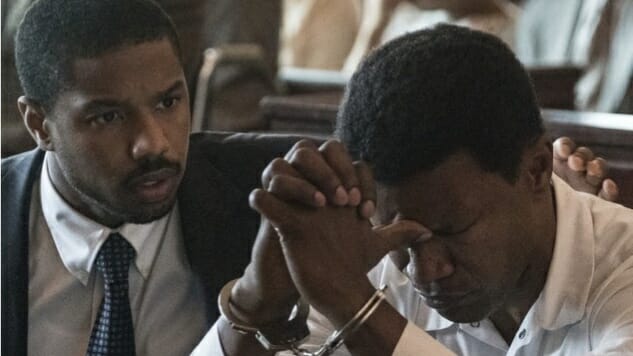Just Mercy Examines the Power of One Man’s Hope Against the “Justice” System
Movies Reviews Justs Mercy
“If you’re looking for justice, that’s just what you’ll find—just us.” —Richard Pryor
Just Mercy, a by-the-numbers inspirational legal drama that decries the American justice system’s imbalance against the poor and people of color, recreates pro bono civil rights attorney Bryan Stevenson’s (Michael B. Jordan) impassioned speech to the U.S. Senate in 2008. Stevenson outlines a hopeful future, where the American ideal is finally realized, and everyone is actually treated equally under the law. The cynical among us will likely feel a kneejerk rejection of the protagonist’s idealism—Ava DuVernay’s chilling documentary 13th already offers a more sobering and unvarnished examination of the subject—yet it’s hard not to get swept up in Stevenson’s lifelong dedication to defending the oppressed and the defenseless. (Watch his amazing TED talk.) It’s also easy to appreciate director Destin Daniel Cretton’s loving tribute to a great man who wholeheartedly believes that while the reality is grim, it’s hope that keeps us alive.
Adapted from Stevenson’s book, Just Mercy dramatizes Stevenson’s struggle to free an African-American man named Walter McMillian (Jamie Foxx) who was wrongfully convicted of murdering a young white woman and was sent to death row. After finishing Harvard, Stevenson moves from Delaware to Alabama in order to defend death row inmates for free. A charming opening scene clarifies his motivation: after finding common ground with a death row inmate, Stevenson realizes that he could have been the one on death row if he was in the wrong place at the wrong time, and decides to represent those who have been abandoned by our broken legal system. Later on in the film, an unnecessary monologue spells out this backstory. The screenplay, by Cretton and Andrew Lanham, occasionally relies on this type of audience handholding after a point has already been made by the visual storytelling. Thankfully, there isn’t enough of it to hinder the film’s pacing.
Stevenson’s initial research into McMillian’s case indicates that he was framed. The state has no concrete evidence, and their key witness is a felon named Ralph Myers (Tim Blake Nelson), who surreptitiously got a reduced sentence after testifying against McMillian. Furthermore, a dozen witnesses are ready to testify that McMillian was cooking with them during the time of the murder. By stating McMillian’s innocence with such undeniable facts from the get-go, Just Mercy’s tone, if not its structure, makes it stand apart from other courtroom dramas. We don’t get procedural sequences focusing on the minute details of the crime, or exposing the inconsistencies in the prosecution’s case. Instead, Stevenson’s fight is to force a system and a society to confront and deal with their own prejudices. This proves to be a harder task for Stevenson, and Cretton patiently chronicles the long and arduous details of the case, while maintaining the audience’s emotional attachment to the characters.
A sub-plot centered on Stevenson witnessing his first execution forms Just Mercy’s most striking scenes. The execution sequence itself takes its time, meticulously showing the process that leads up to someone ending up in the electric chair. Going against the rest of the film’s highly emotional connection to the subject matter and its characters, Cretton takes a clinical approach. The emphasis is on how people ignore the moral weight of killing someone through the mindless repetition of procedure, and it forces the audience to feel the visceral impact of the act.
Jordan portrays Stevenson as a man who’s never conflicted about his mission, but is unsure about the methods with which to achieve it. It’s this inner struggle that takes a protagonist who could have come across as an infallible martyr and grounds him as a person who just wants to do the right thing. Foxx appears to have taken some cues from Denzel Washington’s portrayal of Hurricane Carter, but eventually manages to put his own spin on the beaten but unbroken prisoner trope. Just Mercy occasionally relies on the expected clichés of the genre, and it doesn’t play many new notes—but it’s rarely off-key. Most importantly, it’s genuinely passionate about telling the tale of a man who sought the truth and applied it to attain true equality under the law. Perfectly executed or not, we need these kinds of stories these days.
Director: Destin Daniel Cretton
Writer: Destin Daniel Cretton and Andrew Lanham
Starring: Michael B. Jordan, Jamie Foxx, Brie Larson, Tim Blake Nelson, Rafe Spall, O’Shea Jackson Jr.
Release Date: January 10, 2020
Oktay Ege Kozak is a screenwriter, script coach and film critic. He lives near Portland, Ore., with his wife, daughter, and two King Charles Spaniels.